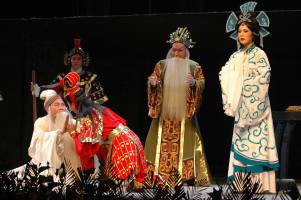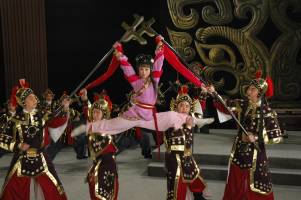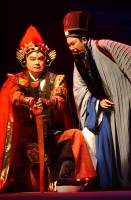Cheng Ying Rescues the Orphan (Cheng Ying jiu gu)
Genre: yuju
Produced by Henan Yuju Theatre, Company No. 2, 2003
Playwright: Chen Yongquan
Director: Zhang Ping
Performers: Li Shujian, Tian Min, Bo Qing, Qi Qiuer, Wang Kewei
About the genre
Yuju, also called henan bangzi, is a local genre in the xiqu form, popular in Henan, Anhui, Shaanxi, Gansu, Shanxi, Hebei, Shandong and Jiangsu provinces. Yuju is also popular in Taiwan. According to the statistics, yuju is one of the leading genres in the traditional song-dance theatre in terms of the number of performers and theatre companies.
As a member of the bangzi musical system, yuju shares the characteristically high-pitched and loud music and most importantly the percussion of clappers. There are different ideas about the genre’s origin. Some scholars believe that the genre generated from the older bangzi music of qinqiang [LINK qinqiang] and puzhou bangzi [LINK puzhou bangzi] when these two theatrical forms entered the area with the travelling acting troupes in the 16th-17th centuries. Practitioners created the new genre by adding Henan local folk songs and melodies into the combined two old bangzi music and created yuju.
Yuju’s role types are similar to jingju [LINK jingju] but conventionally called “four types of sheng”, “four types of dan” and “four types of painted face” including the comic role. It is famous for aria singing; the pronunciation of the words in lyrics is clear and easy to follow. The lyric structure of yuju aria is in couplets. Due to its strong earthy tendency, yuju is good at presenting contemporary countryside lives as well as historical stories.
Scenario:
The Orphan of Zhao is a play based on historical records. [Link to the Exhibition] The orphan was born circa 583 BC during the Spring-Autumn Period – a time when imperial power was being eroded by the growth of numerous aristocratic-family-states. Appalled by the chaos and bloodshed, philosophers such as Confucius (551-479 BC) acted as advisors to rulers on how to control their states and people.
Historical records present contradictory accounts of the story. Most versions of different theatrical genres and films we see now are based on the extant full-length tragedy Wrongs Avenged by the Orphan of Zhao by Ji Junxiang, written in the Yuan dynasty when China was ruled by the Mongols (1279-1368 AD).
The basic story is as follows: schemed by the evil courtier Tu’an Gu, the Zhao clan were all killed except for the Princess who was the Jin Ruler’s sister and was pregnant. After the baby was born, he was smuggled out by a doctor called Cheng Ying. Having realized that the baby boy had escaped, Tu’an Gu gave the order to kill all the newly born boys in the country. Finally, Cheng Ying decided to give up his own child for the Zhao orphan. Meanwhile Cheng Ying and his friend, a retired minister Gongsun Chujiu made a plan. Cheng would report to Tu’an about Gongsun who had the Zhao orphan in his house. Actually the real Zhao orphan was hidden in the deep mountain while Cheng’s own baby son was with Gongsun. Tu’an killed both Gongsun and the child. In order to reward Cheng Ying as a loyal reporter, Tu’an took both Cheng Ying and his son (but actually Zhao’s offspring) to his house and Tu’an made himself the foster father of the boy.16 years later, Cheng Ying revealed the true story to the young man. The orphan of Zhao took the revenge on Tu’an, for his parents, grandparents, his clan and for Cheng Ying. In order to rescue this orphan many people died.
This is an archetypal Chinese story of loyalty, honesty, sacrifice, friendship, evil, revenge, bravery, and justice.
The title of the yuju production Cheng Ying Rescues the Orphan shows that the focus of the play is not the orphan, but Cheng Ying. The script pays more attention to Cheng Ying’s suffering, not only from losing his own son (and witnessing how the baby being killed), but also from people’s misunderstanding of his behaviour. For 16 years, he is regarded as an evil traitor since he has reported to Tu’an that Gongsun Chujiu hid the orphan and as a result, he has been rewarded by the villain. People all over the country hate him and make jokes and even children’s rhymes to mock and curse him. At the end of the play he dies to protect the grow-up orphan, because when Tu’an has realized that his fostered son is actually the orphan of Zhao, he lunges at the young man with his sword but Cheng Ying jumps and uses his body to protect the orphan again.
There are two clips. One shows how Gongsun Chujiu and Cheng Ying’s baby are killed; the other is a trailer of the production that the Henan Yuju Theatre made for the Leeds international symposium Performing China on the Global Stage, held in March 2013.
Images and the video are courtesy of Henan Yuju Theatre, Company No. 2.
《程婴救孤》
剧种:豫剧
演出单位:河南省豫剧院二团,2003年
编剧:陈涌泉
导演:王张平
演员:李树建、田敏、柏青、祁秋娥、王可畏
剧种简介:
豫剧,也叫作河南梆子,是流行于除河南省外,安徽、陕西、甘肃、山西、河北、江苏、山东等地的戏曲剧种。豫剧在台湾很受欢迎。按照国家统计,豫剧是戏曲中拥有最多剧团与从业人数的剧种之一。
作为梆子腔音乐系统中的一员,豫剧具有其他梆子剧种的特点,唱腔高亢铿锵、抑扬有度。关于豫剧的来源,学者有不同的看法。一些人认为在明末清初年间,两个古老的梆子腔剧种“秦腔”和“蒲州梆子”随着流动演出剧团来到了河南。实践者在古老声腔的基础上融入了河南地方的民歌与小调,从而创造出了一个新剧种:豫剧。
豫剧的行当类似京剧,LINK jingju,有“四旦”、“四生”和“四花脸”的说法,“四花脸”中的一个“花脸”即是丑行。豫剧擅长演唱,属于板腔体。因各地语音差异,唱腔音乐上形成带有区域特色的流派,歌唱吐词清晰,语言通俗易懂。强烈的乡土气息使得豫剧在演出古装剧和现代剧方面都非常出色。
更多豫剧参考:
http://baike.baidu.com/item/%E8%B1%AB%E5%89%A7/112631?fr=aladdin
剧情简介:
《赵氏孤儿》是一个春秋时代的故事。〔LINK 展览〕。据史书记载,孤儿出生于公元前583年左右。当时受到“分封制”诸侯日益强大势力的侵蚀,周王权日益衰微,诸侯争霸称雄,战争与血腥屠杀连年不断。同时,诸子百家学说开始出现,并试图就如何管理国家和人民等等给予统治者以哲学性的思考。
史书有着互相矛盾的关于赵氏孤儿的记载。我们现在所看到的各种戏剧形式和电影版本基本上来自于元代纪君祥的《冤报冤赵氏孤儿》。
大致故事如下:奸臣屠岸贾设计将与自己不和的赵氏家族满门抄斩,唯一幸免的是已有身孕的、赵朔的妻子庄姬,她是晋王室的公主。男婴出生以后,就被一位叫作程婴的医生想办法带出了宫苑。当屠岸贾听说婴儿已经逃遁,便下令杀死举国上下所有在这段时期内出生的男婴。几经考量,程婴决定献出自己的亲生儿子以保全赵家唯一的骨血。与此同时,程婴和老友、已经告老还家的公孙杵臼安排了救孤的计划。程婴前往屠岸贾处报告公孙杵臼藏匿了赵氏的孤儿,而实际上,真正赵家的孤儿被藏在深山之中,而公孙那里的婴儿恰恰是程婴自己的孩子。屠岸贾杀死了公孙杵臼和婴儿,为报答程婴举报之功,他把程婴及其儿子(是真正的赵氏孤儿)接回自己家里,好生款待,并把男孩作为自己的养子来呵护养育。孤儿长大成人以后,程婴将孤儿的身世告诉了他本人。为给自己的父母、祖父母、赵氏家族以及为程婴报仇,孤儿杀死了屠岸贾。为了拯救孤儿,诸多英雄献出自己的生命。
《赵氏孤儿》是关于忠义、诚信、牺牲、友情、奸佞、报仇、勇猛和正义的中国原型。
豫剧演出取名为《程婴救孤》,显示出全剧着墨于程婴。演出令观众感受到了主人公为救孤而经受的磨难,他不仅亲眼目睹自己的儿子被活活摔死,而且受到世人的冷眼与误解。在他抚养赵氏孤儿的十六年中,他一直被看作是邪恶的化身,因为是他向屠岸贾举报公孙杵臼藏匿孤儿,并且受到前者的嘉奖。人们编出儿歌来嘲笑、斥责这个千古罪人。最后,当屠岸贾认识到自己的义子竟是自己多年来误以为早已经被杀死的赵氏孤儿时,他一剑刺向赵家的后代,又是程婴以自己的身体再次保护了长大的孤儿。
本实验版本收有豫剧《程婴救孤》两个片断。一个是程婴目睹公孙杵臼与亲子被害的场面,另一个是河南省豫剧院二团在2013年为国际研究互联网项目“舞台中国”召开国际会议“寰球演出中国”时专门制作的有关该剧演出的短片。
诚挚感谢河南省豫剧院二团提供图片与录像。


